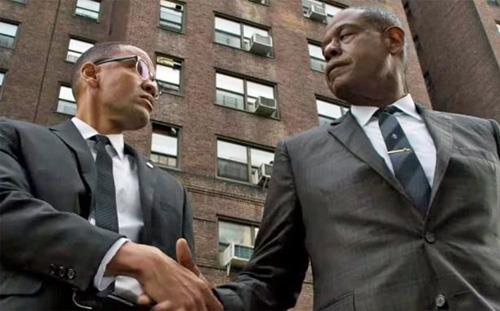
With Godfather of Harlem, organized crime continues its steady march toward becoming one of America's leading racial levelers.
We seem to have a curiously color-blind respect, sometimes bordering on reverence, for Mob bosses.
Godfather of Harlem, a 10-episode series on the last few eventful years of uptown mobster Bumpy Johnson, premieres Sunday at 10 p.m. ET on Epix. It's a story that undeniably draws the viewer in.
In a way, purely as television drama, it caps off a New York black crime trilogy, inevitably echoing elements of Empire and Power. All three revolve around black entrepreneurs who achieved fame and fortune in New York through means not always on the angels' side of the law.
Godfather of Harlem stands apart because there really was a Bumpy Johnson. He was 62 when he died in 1968 of a heart attack in Harlem's famous Wells restaurant.
Godfather also has the immediate appeal of starring Forest Whitaker (top), who also co-produced and co-wrote it.
Whitaker has an inherently milder demeanor than the real-life Bumpy who was known for his quick temper and aggressive attitude. Those traits doubtless served him well in his rise through the ranks of the Mob, where he began as an associate of Lucky Luciano and ultimately ran much of the organized crime in Harlem, sometimes from behind bars. He was arrested more than 40 times and served two drug trafficking sentences.
When we meet Whitaker's Bumpy, it's the early 1960s, and he has just been sprung from a 10-year term, most of it at Alcatraz. He tells his faithful wife, Mayme (Ilfenesh Hadera), that he spent much of the time locked up by himself, an isolation underscored when they pass the Apollo Theater, and he asks who James Brown is.
Much has changed over the past decade, and like most of us when we discover that kind of overhaul, Bumpy doesn't like it.
He especially doesn't like that his carefully crafted uptown drug/protection/prostitution rackets have been taken over by the Genovese crime family, headed by Vincent "The Chin" Gigante (Vincent D'Onofrio).
Since the Genoveses are just one of the five Mob families that run organized New York crime at this point, it's a long-odds challenge for Bumpy to regain control.
He's got friends, though, and he quickly adds more when he forges an alliance of convenience with one of his old associates, a one-time drug runner, formerly known as Detroit Red and now rebranded as Malcolm X.
Malcolm (Nigél Thatch, top) has a passionate determination to short-circuit the drug trade that he sees destroying a generation of black Americans at precisely the moment when they are needed in a climactic battle for self-determination.
If it seems odd that Malcolm X would align himself with a drug dealer to achieve this end, let's call the relationship one part personal connection and two parts transactional.
Bumpy wins if Malcolm X's crew can help him push The Chin and the Genoveses out of Harlem because that leaves the turf open for him to reclaim. Malcolm X wins, apparently, because it exorcises some white devils and perhaps Bumpy won't be as aggressive about pushing product to vulnerable black folks.
While there are further nuances, that seems to be the initial rationale for the alliance.
Not incidentally, nobody in Bumpy's circle – and it's a wide circle – expresses the slightest concern on his release about his occupation. Nobody mentions drugs except those who correctly assume Bumpy will resume selling them. Nobody suggests there might be any problem with selling heroin, even though by the early 1960s no one could have missed the wasted junkies in Harlem's parks and on the streets.
Bumpy personally laments that drug abuse, which used to be somewhat limited to a couple of small niches, has gone mainstream. It may even be personal for him.
Still, since drugs will be sold, he wants his cut. It's about money, and it's also about respect.
Bumpy's stature is reinforced by the well-known people with whom he seems to routinely associate, from The Rev. Adam Clayton Powell (Giancarlo Esposito) to singer Mary Wells.
At the same time, with Mayme and their daughter Elise (Antoinette Crowe-Legacy), Bumpy is a kindly, understanding partner and doting Dad whose most aggressive move is mischievously eating the cherry on top of Elise's ice cream sundae.
Not two minutes after the cherry incident, of course, Bumpy is out in the street exchanging gunfire with a man who has been hired to kill him. Not exactly the perfect ending for a father-daughter moment.
Godfather of Harlem doesn't exactly glorify Bumpy Johnson, any more than previous productions have glorified Harlem's Nicky Barnes or the white Mobsters in The Godfather or The Sopranos.
It does suggest that purely as a businessman, a dealmaker, and an administrator, Bumpy Johnson had star qualities – and that like Colombian druglords who became local heroes for financing soccer fields, he was boosting elements of the same community where he was raking in most of his illegal money.
Whitaker doesn't shy away from the morality conundrum. Neither does he ignore the fact that more than half a century after Bumpy Johnson died, the whole multi-layered story still seems resonant to people who, at the time, weren't even alive.